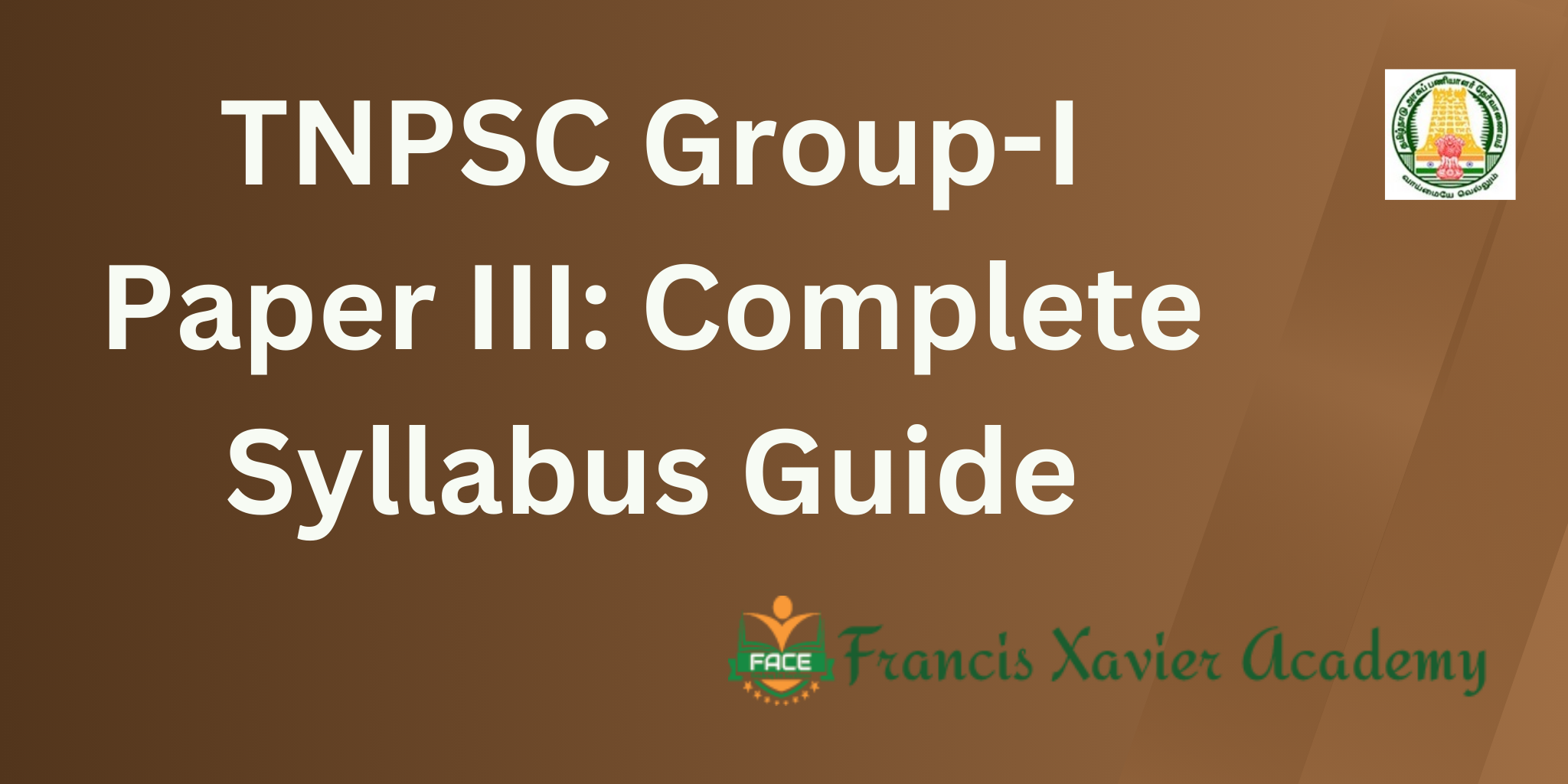
The Combined Civil Services Examination (CCSE) for Group I services is one of the most prestigious competitive exams in India. Aspirants who wish to join the civil services through this exam must clear multiple stages, including the Main Written Examination (Paper III), which assesses their General Studies knowledge. TNPSC Group-I Paper III: Syllabus Guide covers a wide array of subjects under three primary units: Indian Polity, Science and Technology, and Tamil Society, Culture, and Heritage. Below is a detailed breakdown of the syllabus and key topics.
Unit I: Indian Polity and Emerging Political Trends Across the World Affecting India
This unit focuses on the Indian political system, with a deep dive into the Constitution of India and its impact on the country’s governance. Key topics include:
The Constitution of India
- Historical Background: The process of drafting the Indian Constitution.
- Preamble: Core values such as justice, liberty, equality, and fraternity.
- Salient Features: Understanding the distinctive features of the Constitution.
- Parts, Articles, and Schedules: Structure and organization of the Constitution.
- Amendments: The process of constitutional changes.
- Citizenship: Rules and guidelines regarding Indian citizenship.
Fundamental Rights, Duties, and Directive Principles of State Policy
- Fundamental Rights: Rights guaranteed to Indian citizens.
- Fundamental Duties: Obligations of citizens towards the nation.
- Directive Principles of State Policy: Guidelines for the government in ensuring social and economic justice.
Structure, Power, and Functions of Governments
- Union Government: The structure of the Parliament, Executive (President, Prime Minister, Council of Ministers), and Judiciary (Supreme Court, Judicial Review, and Judicial Activism).
- State Government: Structure of the State Legislature (Legislative Assembly and Legislative Council), Executive (Governor, Chief Minister, and Council of Ministers), and Judiciary (High Courts, District Courts, and Subordinate Courts).
- Local Government: Urban and Rural Local Governments, and the 73rd and 74th Constitutional Amendment Acts.
- Union Territories: Administration and governance of Union Territories.
Federalism
- Indian Federal System: A distinct form of federalism, with a focus on the relationship between the Union and State Governments.
- Union-State Relations: Legislative, Administrative, and Financial Relations between the Union and State governments.
Indian Administration
- Civil Services: Classification, recruitment, and training of civil services in India.
- Political Parties and Political Dynamics: The role of national and regional parties, pressure groups, public opinion, mass media, and social media in shaping Indian politics.
- Administrative Reforms: Key reforms like the Central Vigilance Commission, Anti-Corruption measures, RTI Act, and Lokpal.
India and the World
- India’s Foreign Policy: Relations with foreign countries, defense, national security, nuclear policy, and the role in global governance.
- International Issues: India’s stance on terrorism, human rights, environmental issues, and participation in international organizations, pacts, and summits.
Unit II: Role and Impact of Science and Technology in India’s Development
This unit explores the advancements in science and technology and their significant contributions to India’s development. Key topics include:
Scientific Developments
- Chemistry: Elements, compounds, acids, bases, salts, and oxidation-reduction.
- Space Research: India’s achievements in space exploration and research.
- Nano Science and Technology: Applications of nanomaterials and their potential for innovation.
- Information Technology: Developments in AI, robotics, mobile communication, computer systems, and software engineering.
Agricultural Biotechnology and Environmental Impact
- Organic Farming: Practices and importance in sustainable agriculture.
- Genetically Modified Crops: Eco-social impacts, intellectual property rights, and bio-safety.
- Biotechnology in Agriculture: Use of biotechnology in improving crop yields and addressing food security.
Life Sciences and Health
- Genetics: Heredity, genetic engineering, and its role in agriculture and medicine.
- Human Health: Disease prevention, communicable and non-communicable diseases, and the role of government in public health.
- Biotechnology: Stem cell research, organ transplantation, and forensic science.
Science Policies and Government Initiatives
- Government Policies: Role of organizations like DRDO (Defence Research and Development Organisation) in technological advancements.
- Medical Tourism: India’s growing role as a hub for medical tourism.
Unit III: Tamil Society, Culture, and Heritage
This unit focuses on the cultural heritage, social structures, and historical developments of Tamil society. Key topics include:
Origin and Development of Tamil Society
- Archaeological Sites: Insights from excavations at sites like Adhichanallur, Arikkamedu, Keeladi, Konthakai, Manalur, and Sivakalai.
- Palmleaf Manuscripts: Historical documents and their role in preserving Tamil culture
Tamil Arts, Literature, and Culture
- Literature and Music: Contributions to arts and culture, including literature from the Sangam Age and medieval periods.
- Science and Culture: Understanding the interaction between scientific progress and cultural evolution.
Social and Economic Life
- Sangam Age, Medieval Age, and Modern Age: Social structures, economic development, and changes over the centuries.
- Dravidian Movements: Growth of rationalist thought and their impact on social and economic reforms.
Modern Tamil Society
- Caste, Religion, and Education: The evolving socio-political structures and their influence on modern Tamil life.
- Women’s Role: Changes in the role of women in modern Tamil society.
- Commerce and Economy: Economic changes and their influence on Tamil society.
Tamil Diaspora and Global Influence
- Tamil Diaspora: Influence of Tamil communities around the world and their relationship with Tamil Nadu.
- Media and Digital Technology: The role of print, media, and the internet in shaping modern Tamil identity and culture.
Conclusion
Paper III of the Combined Civil Services Examination (Group I Services) is designed to test the candidate’s knowledge of key areas related to Indian polity, science and technology, and Tamil society. TNPSC Group-I Paper III: Syllabus Guide helps candidates develop a thorough understanding of these topics not only helps in answering questions effectively but also in cultivating critical thinking and analytical skills essential for a career in civil services.
Candidates are advised to prepare in-depth for each of the sections mentioned in the syllabus and stay updated on current affairs and advancements in science and technology. This comprehensive approach will ensure a strong foundation for cracking the exam and making a significant contribution to India’s governance and development.
 Now
Now